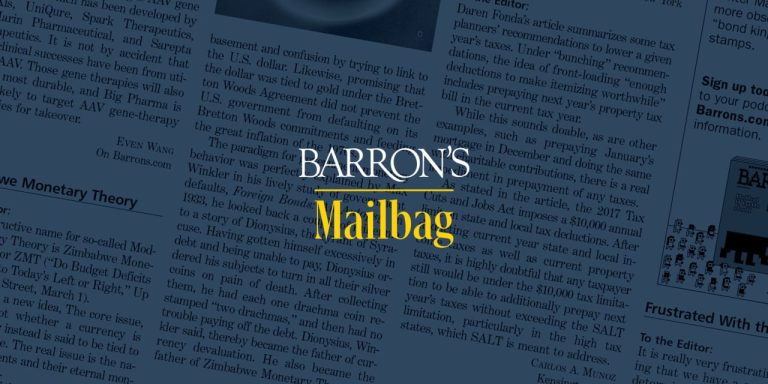To the Editor:
Poor building codes in hurricane-prone regions mean that insurance companies make more money because they can charge more for premiums (“The Big Reason Your Insurance Is Getting More Expensive,” Cover Story, Aug. 26). If no disasters, accidents, etc., happened, we wouldn’t need insurance. Some communities in Florida build homes to withstand winds of 150 miles per hour. That should be the standard so the rest of us don’t have to pay for poor building codes.
Geoffrey Bailey
On Barrons.com
The Price of Paradise
To the Editor:
Yes, the planet is warming—slowly, and yes, the sea is rising but only by inches (“Why People Are Still Moving to Places With High Climate Risk,” Aug. 24). I have lived in Santa Barbara, Calif., for 50 years and have seen countless fires. I even had to evacuate three times. It’s the price you pay for living in paradise. We are all ultimately powerless against nature. It has always been so.
Ray Noack
On Barrons.com
$2.4 Trillion Boondoggle?
To the Editor:
I don’t think that events of the past several years—pandemic, climate change, China aggression, etc.—have opened a door for more government involvement in the economy (“The Manufacturing Boom’s Hidden Costs,” Aug. 23). When hasn’t the government meddled in economic affairs over the past 150 years? One of the purposes of this iteration is to increase U.S. competitiveness vis-à-vis China and the rest of the world. However, the U.S. already out-innovates the rest of the world by a wide margin. If China cheats, there has to be a better response than a $2.4 trillion boondoggle.
Rick Reynolds
Malvern, Pa.
To the Editor:
If reshoring manufacturing will increase costs because of the cost of labor here, how about the much-talked-about artificial intelligence and automation, which tend to increase efficiency and therefore reduce costs?
Shirley Tsai
On Barrons.com
Uncle Sam, Spend Less
To the Editor:
“High Interest Rates Are Hitting Federal Debt. A Day of Reckoning Is Coming” (Other Voices, Aug. 23) overlooks the real danger of the growing national debt: Debt service alone is taking an increasing share of federal expenditures—thus crowding out room for essential spending on defense, government operations, and entitlements. Thus, to service those needs, the government will have to continually increase its borrowing, which leads to ever-increasing interest rates. The government cannot tax its way out of this vast debt problem. Only reductions in spending can do it.
Gary R. Layton
Interlaken, N.J.
Send letters to: [email protected]. To be considered for publication, correspondence must bear the writer’s name, address, and phone number. Letters are subject to editing.
Read the full article here









